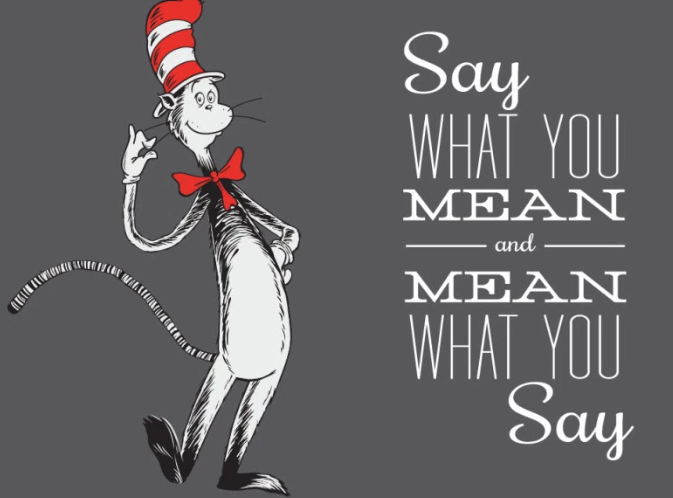As a parent, there are things you say to your child that you never expected to utter in your lifetime, let alone to a human being.
“No, you cannot lick that.”
“Underwear goes on our bottoms, not our heads.”
“Please don’t stick your lollipop up your nose.”
There are also things you say to your child every day, like asking them to brush their teeth or to share with their friends.
In the Burr household, a big one for us is, “Say what you mean, and mean what you say.”
I’ve found this applies to a lot of situations, from learning to tell the truth to thinking of others’ feelings. And, in thinking about it more, it also works as a great writing lesson, too – and, again, for a lot of different reasons.
Be real
Authenticity is critical to good writing. If you want a client to care about what you’re offering, then you need to genuinely care, too.
In a world where we are more connected than ever through groundbreaking, evolving technology, our society is also at a point where we not only crave human connection but we’re also more in-tune to insincerity and hollowness. Weak advertisements and phony marketing schemes go viral within hours, and proposals that seem as equally disingenuous will be tossed to the bottom of a client trash can just as quickly.

Sticks and stones
Another valuable lesson within the short “Say what you mean, and mean what you say” phrase deals with the impact of your words. Just as a bully cannot take back a particularly hurtful jab, the writing in your proposal remains as is for the life of the document.
Because of that truth, you want those words to mean something. Yet again thinking of the world we live in today, our reputation is vital to our success. Word-of-mouth is no longer a great way to earn business, but almost the exclusive way considering the breadth of reviews available at the click of a button.
Likewise, filling your proposal to the brim with flowery adjectives, weak adverbs and evil liar words – such as “better” and “more” and even “tripled” – diminishes your credibility. The more focused and the more specific you can be, the more believable you are. Plus, per the above point, making your document more concise means you won’t be submitting a 400-page proposal that (inauthentically) boasts about sustainability.
What now?
Finally, digging even deeper, it’s important when writing a proposal to literally say what you mean. I cannot tell you how many times the editing team has run across misused words when combing through proposals. Well, I could – we have. Twice.
Some of what we see is quite common. Compliment when it’s supposed to be complement, further when they meant farther. Some are obviously typos and silly mistakes that are actually kind of funny, like pasty for pastry or desert for dessert. Others, however, are downright confusing; contagion for catalyst, I’ll still never understand.
The point is, when writing proposals, try to set aside the fact that you have to write something and focus on why you’re writing it and to whom you’re writing. Then, say what you mean, and mean what you say.
Now, for the last time, go brush your teeth!

Don’t be sad. We’ll be back on the first Monday next month with a new blog post. If you can’t wait that long—whether because you have a topic you’d love us to cover, a question or you simply want to throw your two cents into the pot—we love talkin’ shop, so drop us a line.






